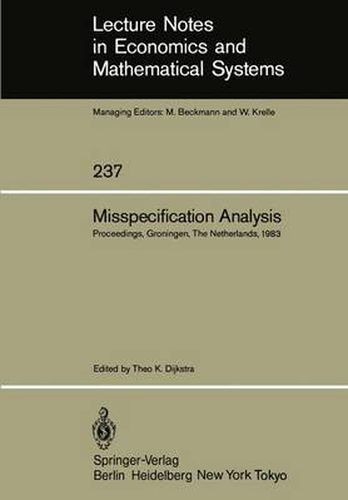Readings Newsletter
Become a Readings Member to make your shopping experience even easier.
Sign in or sign up for free!
You’re not far away from qualifying for FREE standard shipping within Australia
You’ve qualified for FREE standard shipping within Australia
The cart is loading…






This title is printed to order. This book may have been self-published. If so, we cannot guarantee the quality of the content. In the main most books will have gone through the editing process however some may not. We therefore suggest that you be aware of this before ordering this book. If in doubt check either the author or publisher’s details as we are unable to accept any returns unless they are faulty. Please contact us if you have any questions.
This volume collects papers prepared for the workshop ‘~isspecification Ana- lysis held in Groningen. The Netherlands. December 15th and 16th. 1983. The papers. which cover a wide range of problems. contain a number of interesting and fruitful ideas. A bird’s-eye view of the contents of the papers is as follows: White describes in a very general setting properties of classical statistical procedures when models are misspecified. Verbeek provides a lucid analysis of the statistical complexity of the model selection process. Dijkstra indicates how to construct good estimators. taking the possibility of misspecification explicitly into account. Taking the view that measured variables are never continuous. De Leeuw dis- cusses in an illuminating way whether. and how. the discreteness of the data should and can be taken more seriously. Starting from the thesis that models are at best useful approximations of reality. Van ~ag and Koster derive properties of estimators determining best fitting hyperplanes. Within the context of the errors-in-variables problem. Bekker, Xapteyn and Wansbeek provide an elegant description of the variation in estimation re- sults due to part of the modelspecification varying, while estimators are .adjusted so as to keep them consistent. Bierens develops consistent tests of the hypothesis of parameter constancy against extremely diffuse alternatives.
$9.00 standard shipping within Australia
FREE standard shipping within Australia for orders over $100.00
Express & International shipping calculated at checkout
Stock availability can be subject to change without notice. We recommend calling the shop or contacting our online team to check availability of low stock items. Please see our Shopping Online page for more details.
This title is printed to order. This book may have been self-published. If so, we cannot guarantee the quality of the content. In the main most books will have gone through the editing process however some may not. We therefore suggest that you be aware of this before ordering this book. If in doubt check either the author or publisher’s details as we are unable to accept any returns unless they are faulty. Please contact us if you have any questions.
This volume collects papers prepared for the workshop ‘~isspecification Ana- lysis held in Groningen. The Netherlands. December 15th and 16th. 1983. The papers. which cover a wide range of problems. contain a number of interesting and fruitful ideas. A bird’s-eye view of the contents of the papers is as follows: White describes in a very general setting properties of classical statistical procedures when models are misspecified. Verbeek provides a lucid analysis of the statistical complexity of the model selection process. Dijkstra indicates how to construct good estimators. taking the possibility of misspecification explicitly into account. Taking the view that measured variables are never continuous. De Leeuw dis- cusses in an illuminating way whether. and how. the discreteness of the data should and can be taken more seriously. Starting from the thesis that models are at best useful approximations of reality. Van ~ag and Koster derive properties of estimators determining best fitting hyperplanes. Within the context of the errors-in-variables problem. Bekker, Xapteyn and Wansbeek provide an elegant description of the variation in estimation re- sults due to part of the modelspecification varying, while estimators are .adjusted so as to keep them consistent. Bierens develops consistent tests of the hypothesis of parameter constancy against extremely diffuse alternatives.